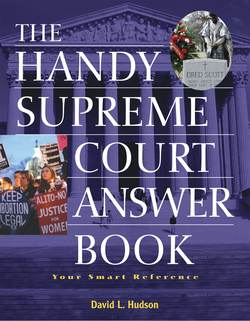Читать книгу The Handy Supreme Court Answer Book - David L Hudson - Страница 20
На сайте Литреса книга снята с продажи.
What other provisions of the Constitution imply a power of judicial review on the part of the courts?
ОглавлениеThe Supremacy Clause of the Constitution, at least to some historians and scholars, provides some justification for the principle of judicial review. Chief Justice John Marshall cited the Supremacy Clause in his famous Marbury v. Madison (1803) opinion, which declared that the judiciary had the power of judicial review. Marshall wrote:
It is also not entirely unworthy of observation that in declaring what shall be the supreme law of the land, the constitution itself is first mentioned; and not the laws of the United States generally, but those only which shall be made in pursuance of the constitution, have that rank.
Thus, the particular phraseology of the Constitution of the United States confirms and strengthens the principle, supposed to be essential to all written Constitutions, that a law repugnant to the Constitution is void; and that courts, as well as other departments, are bound by that instrument.
Chief Justice John Marshall referred to the Supremacy Clause when giving his opinion in the famous Marbury v. Madison trial in 1803. This case declared that that the judiciary had the power of judicial review. Hulton Archive/Getty Images.
